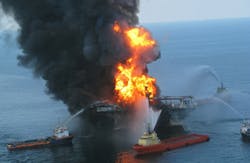The U.S. Department of Justice announced last week that drilling rig operator Transocean Deepwater, whose floating Deepwater Horizon oil rig exploded in 2010, causing a huge oil spill in the Gulf of Mexico, has agreed to plead guilty to violating the Clean Water Act in the disaster and will pay $1.4 billion in criminal and civil fines.
The explosion happened on April 20, 2010, while the Deepwater Horizon rig was drilling a well for British multinational oil and gas giant BP. Criminal and civil charges were settled by BP in November 2012 for $4.5 billion. The explosion killed 11 men and caused millions of gallons of oil to flow into the Gulf of Mexico, damaging the shores of coastal states.
Transocean admitted that its staff had been negligent in their work and failed to identify that the Macondo well was not fully secure and did not detect that oil and gas were flowing into the well. The fines include $400 million to be paid out for criminal charges and $1 billion to settle civil penalties, including funding spill prevention and environmental restoration in five states that were most seriously affected by the spill, with a payment of $150 million to both the National Academy of Sciences and the National Fish and Wildlife Foundation. Officials needed three months to remove the oil spilled into the water.
Attorney General Eric Holder said in a statement that the guilty plea agreement signed by Transocean is a step toward justice for "the human, environmental and economic devastation" that the Deepwater Horizon disaster caused. Assistant Attorney General Lanny A. Breuer commented that Transocean's employees at the rig continued working on the well, as directed by BP, even though there was clear evidence of danger: a decision that cost many of them their lives. The fact that the company has pleaded guilty and has agreed to pay a $1.4 billion fine is proof that it realizes the role it played in causing the accident, he also noted.
Although Transocean has agreed to settle the case by pleading guilty, the agreement will have to be approved by the court and will still be subject to public comment and court approval. As part of the agreement, the company agreed to have its drilling practices monitored over the next five years and has expressed its commitment to improve safety measures for staff and the environment.
The agreement was welcomed by the Environmental Protection Agency (EPA), whose assistant administrator for the office of enforcement and compliance assurance, Cynthia Giles, said that the settlement was a positive move toward holding Transocean and others involved in the spill accountable for the incident. She added that the EPA will continue its work with the Department of Justice and its federal partners to pursue the government's claims against everyone involved and to make sure that every possible step to restore and protect the Gulf Coast ecosystem is being taken.
